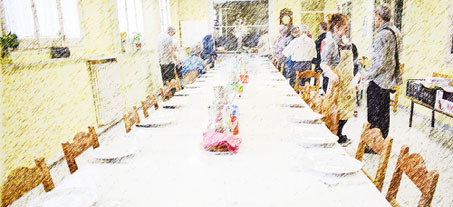This contribution discusses the epistemological clash between ethnographic fieldwork in social systems of (mis)trust and university research ethics procedures and forms based on “contractual ethics”.
To play or not to play the research ethics “game”
Sitting among over 30 people chatting in a circle just before a community assembly, I approach one of the community responsables, Rita, to tell her that I need to obtain formal consent to record this meeting for my PhD project. She conclusively claims that “nosaltres no juguem a aquest joc” [we don’t play this game] and that I shouldn't worry about this. I kindly explain that this is a requirement for my thesis and she offers to write a letter in the name of Emmaus Barcelona saying that I can record all meetings. Next, I request to ask the participants in this community assembly if they mind me recording this event, and Rita does not seem to understand why I do this and tells me that they agreed to this last week. I explain that this should be done every time I intend to record. She seems bothered but nonetheless jokingly tells everyone that “la noia de la gravadora” [the recorder girl] (i.e. me) requests to record this meeting (fieldnotes, 15-11-2011). In future assemblies, my request for oral consent to record at the beginning of each assembly met their general (sometimes joking) disapproval every time and I was even nicknamed “superagent 88” once (assembly, 13-12-2011). When I asked every single participant to sign a form given that the community’s letter was not enough to avoid coercing individuals, a volunteer complained about the term “subject” in my consent form - because “I am not a subject, I am a participant in the study”- while she was signing it (assembly, 07-02-2012).

My experience at Emmaus Barcelona exemplifies Shannon’s claim that “what is key to fieldwork relations - rapport and trust - is antagonised by the need for signed, written documents that are often part of IRB [Institutional Review Board ] procedure” (Shannon, 2007, p. 229). Emmaus Barcelona is a social setting where collective participation in a given project (e.g. my ethnographic study) emanates from a consensual decision in an assembly. Local groups belonging to the Emmaus movement of international solidarity are based on three pillars: 1) a community of life (“the house”) among people of different backgrounds, 2) a recycling cooperative as a means to sustain the community and solidarity projects, with the help of external volunteers, and 3) solidarity initiatives both locally and abroad. My access to the Barcelona community was facilitated by my previous volunteer work in local language classes and an action research project in their residential project for homeless migrants. As a result, my positioning was that of “una amiga de la casa” [a friend of the house], that is, an insider. My participants regarded individual ethics consent procedures as contrary to their collective ethos and my categorisation as an insider who had been socialised into the group.
Standard consent procedures foregrounded our contractual relationship over the personal collaborative rapport that we had constructed during fieldwork. The institutional procedure or “game”, which I insisted on following as a PhD candidate, makes the institution, Universitat Autònoma de Barcelona, a mediating actor in the relationship between the participants and the ethnographer. Consent forms transform relationships in the field as the researcher became an institutional representative, or a broker, of a university while informants were constructed as passive “human subjects” in my forms, based on previously used ones in my research group. Besides, this institutionalised procedure presupposed problems of trust between the researcher and the research participant. Research ethics committees regulate the “right” ways to work with people in order to protect the informants’ individual rights but also release some rights to the research institution to avoid litigation. Top-down bureaucratic consent has been questioned as a paternalist approach that constructs “human subjects” as vulnerable and powerless and thus in need of institutional protection. We have seen, however, that passive “subjects” in my consent forms are actually agentive social actors who renegotiate, and even opt out, of the rules of the “game”.
In universities that require research ethics approval, we must anticipate research procedures in our proposals before entering the field. This means that research ethics boards and ethnographers set the terms of research, which informants can either accept or not, often by means of institutionally-approved consent forms signed at one point during the non-linear research process. “Contractual ethics” uses a standardised language(s) that informants should master and draws on elaborate vocabularies for restricted aspects of complex phenomena. The focus on certain aspects like anonymity, informed consent or scientific purposes obscures issues that might be more important for social actors in the field, such as choice and value of research topic, the forms and strategies for making research results available to the studied communities and the potential decontextualisation and misinterpretation of data.
How did I navigate this ethnographic constraint?
In order to obtain voluntary informed consent, ethnographers must negotiate with potential informants the terms of their participation in the study in a culturally- and socially-appropriate manner. Ideally, participants’ consent should be negotiated throughout the research process as fieldwork conditions change. The AAA principles for professional responsibility that we adopted for ethnographic fieldwork ground ethics as situated social practices negotiated with participants in our research. “Ethical reflection and choice are clearly located in social relationships and, further, viewed as part of on-going processes of negotiation and reciprocity” (Brenneis, 2006, p. 540).
Following the collective, assemblearian decision to allow me to do fieldwork in Emmaus Barcelona, I informally discussed the research goals, methods, ethics and dissemination with Emmaus members in an assembly. I also explained and discussed my research with individuals who asked or when introducing myself in a new socio-communicative space. After the first stage of participant observation, during which I orally informed and obtained consent from social actors, I renegotiated consent and the terms for recording assemblies and one-to-one interviews. This is when I introduced the university “consent form” as a textual artefact. I obtained signed consent from all the people whom I interviewed, with the exception of oral consent from residential project participants who were undocumented migrants (fieldnotes, 03-12-2011). As we saw in my opening vignette, assemblies posed a challenge because it would have been extremely disruptive to obtain signed consent from over 20 people for every single recording. However, I asked participants if they would allow me to record before each assembly and reminded them about their right to stop the recorder or to erase parts of my recording, following ethics guidelines. In the face of this epistemological clash, Rita (one of the community responsables) and I drafted an institutional letter signed by Emmaus Barcelona for the Ethics Committee to authorise collection of different types of data. As a compromise, it includes explicit collective permission to record all meetings from November 2011 and an obligation to obtain individual consent from all regular participants in my study.
Concerning the individual protection of participants, I believe that the preference for collective consent did not coerce individual people to participate. A good measure of the success of voluntary consent is the fact that some people actually negotiated their terms of participation. Some migrants and external volunteers, many from lower socioeconomic classes, refused to have their interviews recorded or even to be interviewed even though they were happy to “hang out” or have me observe their daily activities. Protective ethical measures are not new to social groups such as the formerly homeless, the undocumented or the unemployed in this Emmaus community. They are often subject to multiple forms of discrimination which involve bureaucratic forms in both nongovernmental and public services. This partly explains their refusal to engage with university forms and their resistance through non- participation or alternative forms of participation. Nevertheless, the academic genre and the formal register used might alienate social actors without higher education.
According to Salinas et al. (2000), unethical ethics questions “our would-be benevolent interventions were often resisted by 'participants' as culturally inappropriate or potentially harmful” (p. 109). Even though we found a compromise not to do harm to the community and to the PhD candidate’s evaluation, I still think that I/we need to find alternatives to engage in a truly collaborative and socially appropriate form of ethics that moves away from contractual ethics while conforming to institutional requirements. This could consist in engaging in prior negotiations with informants about the medium, language(s) and foci of the research ethics procedure and forms to be submitted where it is possible to do so. This calls for slow science, which is at odds with fixed-term research grants and the pressures to produce outcomes. This proposal also requires that we ethnographers relinquish some of our knowledge-generation goals in favour of community-led goals and agendas.
